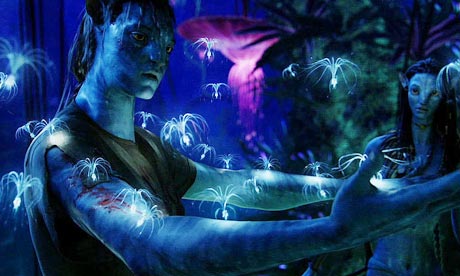
One was the year of A Clockwork Orange and decimalisation. The other was that of Avatar and the shattered economy. But while 1971 and 2009 were wildly different in terms of the technological limits of the films on offer, new figures published today show that they shared similarly buoyant levels of cinema-going.
They record that last year was the best ever in terms of box office takings and the second best year since 1971 in terms of admissions, fuelled by the continuing growth of 3D and the through-the-roof success of Avatar, as well as the enduring, recession-resistant appeal of the big screen.
The figures were published in the UK Film Council's annual statistical yearbook, a mammoth, eye-hurting publication that is nevertheless packed full of interesting data on film trends, showing that cinema-going appears to be bucking the recession.
For the first time, the yearbook will be available in full online. The council's chief executive, John Woodward, said the point of the figures was "to allow everyone to stand back and have a look at the big picture yourself and take your own view".
Woodward said, in terms of jobs, inward investment and contribution of cinema to the British economy, "there is absolutely no doubt the film sectors are firing on all cylinders". He added: "The figures prove that film really matters to people, it's an absolutely integral part of their leisure time."
In terms of box office, it was a record year with takings topping £944m. Cinema admissions also shot up from last year's healthy 164 million to 174 million, not quite beating 2002 (176 million), but still up 6% and the second highest number since 1971.
To put that in perspective, cinema-going began declining in the 1950s and 1960s with the arrival of television and plummeted in the 1980s with the video revolution, reaching a nadir in 1984 (The Karate Kid, Ghost Busters) when admissions were down to 54 million people. The arrival of multiplex cinemas soon after drove a steady increase, hitting a peak eight years ago when several blockbusters came out, from Spider-Man to the second Lord of the Rings and the second Harry Potter film .
The UK Film Council statisticians examined the correlation between recessions and cinema admissions going back to the 1970s.
David Steele, the council's head of research and statistics, said: "It does appear that, over time, cinema admissions are recession resistant."
One reason for that, he said, was that if people did start cutting back on luxuries and cancelling foreign holidays, they were then even less willing to give up going to the pictures.
The 3D revolution arrived in earnest, with 14 3D films accounting for 16% of UK and Ireland box office revenues, up from 0.4%. There are still sceptics but Steele said: "It does not appear to be a flash in the pan."
The biggest 3D film of them all, Avatar, played a big part in the financial health of the movie industry. Not only did it replace Mamma Mia! as the biggest grossing movie of all time, it replaced 1998's Titanic in the council's inflation-adjusted top 20. Third in that list is Harry Potter and the Philosopher's Stone, with Jaws in sixth place and The Full Monty in ninth.
Other interesting stats show that comedy accounted for 24% of releases and 20% of box office, while drama was 21% of releases but just 7% of box office.Avatar made science fiction the box office king.
There are tables showing the strength of British talent at making movies, both in front and behind the camera. One shows that between 2001 and 2009, 14% of all film awards were won by Britons. Another shows that of the top 200 movies at the box office between 2001-09, 30 were based on stories or characters by British writers. And Orlando Bloom may want to print out the table showing the top UK actors' frequency of appearances in the top 200 films.
The list goes Bloom, Daniel Radcliffe, Emma Watson, Rupert Grint, Ian McKellen, Christopher Lee, Jonathan Pryce, John Cleese, Ewan McGregor and Christian Bale.
It is not all good news though. UK independent film makers face difficult times with producers finding it harder to make the films and lowering their budgets.
Woodward said: "This is where I'm worried. Independent production has always been a tough business but the overall value of low budget independent film production in the UK fell by 18% in 2009. Budgets fell from £1.7m to £1.5m. And the overall number of films made fell from 77 to 71. I'm not saying it is a catastrophe; what I am saying is that there is something quite serious going on."
Much of the problem stems from the global economic downturn and also the failure so far of the movie industry to work out how best to make money from the internet.
"The evidence is that the transition into the digital world is going to be quite bumpy," said Woodward.
Alongside the yearbook, the council also published film production statistics for the first half of 2010 which show a fall in inward investment, down from £617m in the first half of 2009 to £557m. That figure is healthy though if you compare it with £218m in 2008 and £333m in 2007.
The big inward investment movies – or Hollywood funded – of 2010 include the final Harry Potter, John Carter of Mars and the next Pirates of the Caribbean.
In terms of this year all the evidence shows that 2010 could be just as good as 2009, despite a miserable June when the World Cup meant there was nothing on so nobody went to the cinema; or nothing good was put on because it was thought nobody would go.
No comments:
Post a Comment